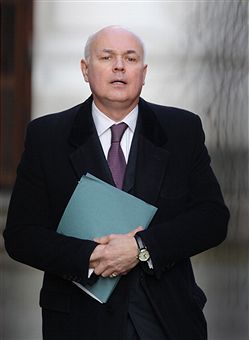Iain Duncan Smith is quietly spoken. His interview with today’s Times (£) is a case in point. The political elite are ‘distanced’ from the people, he says. The Leveson inquiry is there to ‘clean the house’. The job of government is to govern well, not be loved. The ‘omnishambles’ will pass because David Cameron has ‘the capability to pull himself and us all through’.
But, amid these placid notes, is a subito fortissimo. The welfare secretary sets himself against George
Osborne’s wish that a further £10 billion in welfare cuts be found by 2016. He says:
‘This is my discussion with him… My view is that it’s not [all going to come from welfare]… We’ll have a look and see what scope there is but we’re all in this together…
There is no such thing as an easy target in welfare … We have a responsibility to support people in difficulty, we can’t run away from that.’
There will be substantial savings if IDS’ out of schemes are successful. But in terms of further programme cuts, it would seem that the secretary of state believes the poorest have born their
share already. However, what of the middle classes? IDS suggests that there is some room for more savings here:
‘I don’t agree with those who say, ‘Unless the middle classes are in the welfare system we’re not all in this together’… The welfare system is there to support you in
times of need and when you get clear of it you should be clear of it … It’s rather daft to take tax off the middle classes and pay them a little bit back … That’s a very expensive
way of giving a bribe.’
IDS doesn’t provide any concrete ideas beyond urging comfortable people to return their winter fuel allowance. But his statement of intent on universality is important. This government and
this opposition have been over this contentious ground before, during the prelude to the
comprehensive spending review. The government thought discretion to be the better part of valour on that occasion: the universal welfare state persisted and attempts to reform so-called
‘middle class benefits’, like child benefit, have been shambolic. But these controversies are likely to be renewed as the government searches for deeper savings.






Comments